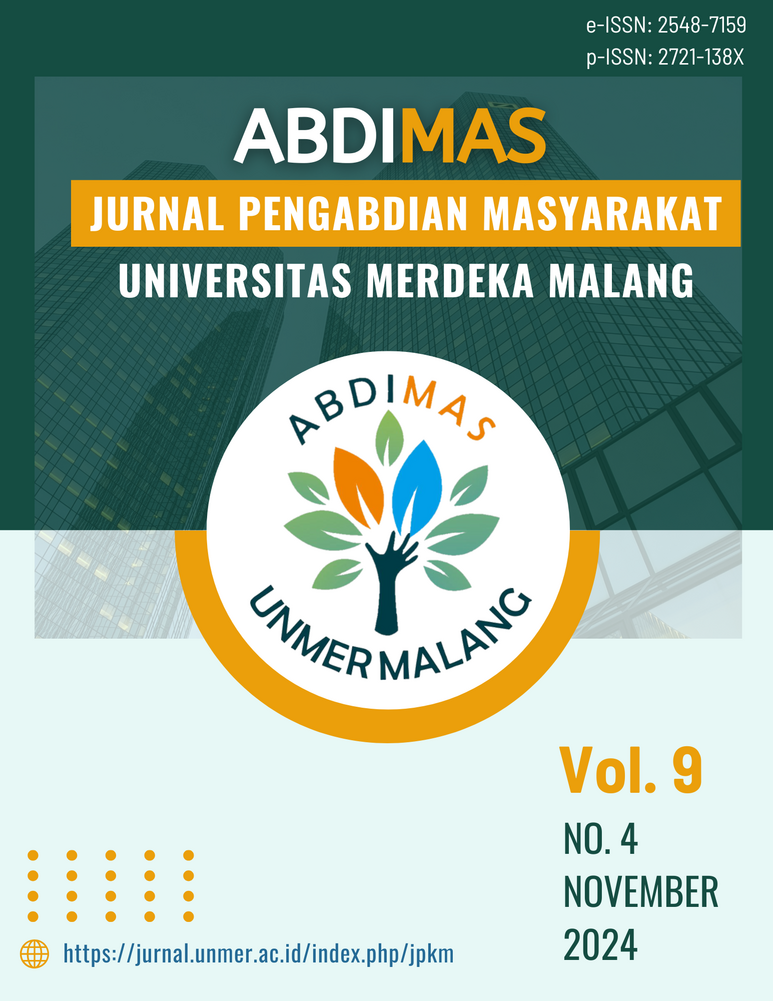Inclusive learning innovation with mobile-based bilingual interactive games for slow learner students
DOI:
https://doi.org/10.26905/abdimas.v9i4.14482Keywords:
Bilingual, CBPR (Community-Based Participatory Research), Game mobile, Inclusive education, Interactive game, Slow learnerAbstract
This Community Service Program developed a mobile-based bilingual interactive game called "Safari Kingdom" for slow learner students in inclusive education. The purpose of this service is to improve the language and cognitive skills of slow-learner students in an inclusive educational environment. The method used is CBPR (Community-Based Participatory Research) which develops games in collaboration with teachers, students, and lecturers in designing innovative learning media that supports students' language and cognitive skills. The development process includes prototyping, initial trials, and ongoing evaluation with feedback from stakeholders. The results of the implementation show that the use of this game has a positive impact on the understanding of slow-learner students in bilingual learning, increase learning motivation, and assists teachers in integrating technology into teaching methods. The average quiz score of students increased from 43.6 in conventional learning to 84.6 after using the game. A questionnaire of teachers and guardians of students revealed that 90 percent agreed that the use of games increased learning motivation, while 95 percent supported the effectiveness of mobile game-based learning. The program successfully integrates technology into more inclusive and interactive teaching methods.
Downloads
References
Damanik, B. E., SE, M., Saifullah, M. K., Kom, S., Suhendro, M. K. D., & Kirana, I. O. (2020). Macam variable yang mempengaruhi motivasi belajar (Kompetensi, fasilitas, lingkungan belajar). Penerbit Adab.
Fauzan, A., & Yerizon, Y. (2013). Pengaruh pendekatan RME dan kemandirian belajar terhadap kemamampuan matematis siswa. Prosiding SEMIRATA 2013, 1(1).
Gandasari, P., & Pramudiani, P. (2021). Pengaruh aplikasi wordwall terhadap motivasi belajar IPA siswa di sekolah dasar. Edukatif: Jurnal Ilmu Pendidikan, 3(6), 3689-3696. https://doi.org/10.31004/edukatif.v3i6.1079
Kurniasih, M. D., Darojati, H., Waluya, S. B., & Rochmad, R. (2020). Analisis gesture siswa tunarungu dalam belajar matematika di tinjau dari gender. JKPM (Jurnal Kajian Pendidikan Matematika), 5(2), 175-182. http://dx.doi.org/10.30998/jkpm.v5i2.5455
Mualif, A., Haswan, F., & Nopriandi, H. (2024). Pelatihan pembuatan media pembelajaran game interaktif bagi guru Madrasah Ibtidaiyah Miftahul Ulum Desa Kuantan Sako. Nuansa Akademik: Jurnal Pembangunan Masyarakat, 9(2), 499-510. https://doi.org/10.47200/jnajpm.v9i2.2604
Nurdin, N., & Munzir, M. (2019). Pengaruh lingkungan belajar dan kesiapan belajar terhadap prestasi belajar ilmu pengetahan sosial. Faktor: Jurnal Ilmiah Kependidikan, 6(3), 247-254. http://dx.doi.org/10.30998/fjik.v6i3.5266
Nuraeni, Y., Puspita, D. R., & Widihaningsih, R. (2023). Hubungan lingkungan sekolah dengan pembentukan karakter siswa kelas IV sekolah dasar. Innovative: Journal of Social Science Research, 3(3), 7279-7287.
Rosyidah, N. (2021). Pendampingan pembuatan laporan keuangan KSPPSAl-Amanah Sawocangkring Sidoarjo menggunakan metode CBR. DINAMIS: Jurnal Pengabdian Kepada Masyarakat, 1(2), 108-116. https://doi.org/10.33752/dinamis.v1i2.5720
Rahayu, W. A., & Riska, S. Y. (2018). Developing English vocabulary learning game. Jurnal Cakrawala Pendidikan, 37(1), 85-96. https://doi.org/10.21831/cp.v37i1.15965
Rahmi, F. N., Wijayanti, S., & Karipui, I. B. (2024). Optimalisasi penerapan pendidikan inklusif pada lembaga pendidikan anak usia dini di wilayah Desa Sindanglaya. Diseminasi: Jurnal Pengabdian kepada Masyarakat, 6(1), 67-78. https://doi.org/10.33830/diseminasiabdimas.v6i1.6847
Ramadanis, F., Solina, W., & Mulyani, R. R. (2023). Pengaruh lingkungan belajar terhadap pendidikan karakter peserta didik di Kelas XI SMK Negeri 1 Tanjung Raya Kabupaten Agam. Jurnal Ilmiah Profesi Pendidikan, 8(4), 2587-2593. https://doi.org/10.29303/jipp.v8i4.1606
Riska, S. Y., & Rahayu, W. A. (2018). Perancangan game IDO untuk pembelajaran kosa kata Bahasa Inggris menggunakan Construct 2. Jurnal Desain Komunikasi Visual Asia, 2(1), 20-36. https://doi.org/10.32815/jeskovsia.v2i1.315
Saputra, V. H., & Febriyanto, E. (2019). Media pembelajaran berbasis multimedia untuk anak tuna grahita. Mathema: Jurnal Pendidikan Matematika, 1(1), 15-23.
Setyorini, I. D., & Wulandari, S. S. (2021). Pengaruh media pembelajaran, fasilitas dan lingkungan belajar terhadap hasil belajar selama pandemi Covid-19. JURNAL PROFIT: Kajian Pendidikan Ekonomi Dan Ilmu Ekonomi, 8(1), 19-29. https://doi.org/10.36706/jp.v8i1.13598
Sumiaty, S., Kamasiah, K., & Karim, K. (2022). Pengaruh lingkungan belajar dan motivasi siswa terhadap pendidikan karakter di sekolah dasar. TAKSONOMI: Jurnal Penelitian Pendidikan Dasar, 2(2), 83-91. https://doi.org/10.35326/taksonomi.v2i2.2695
Downloads
Published
How to Cite
Issue
Section
License
Copyright (c) 2024 Abdimas: Jurnal Pengabdian Masyarakat Universitas Merdeka Malang

This work is licensed under a Creative Commons Attribution-ShareAlike 4.0 International License.
Authors who publish with this journal agree to the following terms:
- Copyright of the published articles will be transferred to the journal as the publisher of the manuscripts. Therefore, the author confirms that the copyright has been managed by the journal.
- Publisher of Abdimas: Jurnal Pengabdian Masyarakat Universitas Merdeka Malang is University of Merdeka Malang.
- The copyright follows Creative Commons Attribution-ShareAlike License (CC BY SA): This license allows to share, copy, and redistribute the material in any medium or format, adapt, remix, transform, and build upon the material, for any purpose, even commercially.





